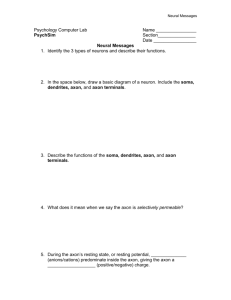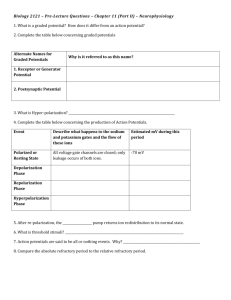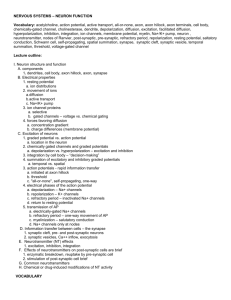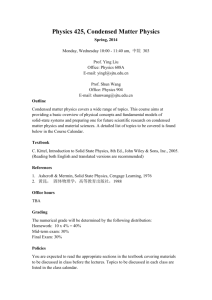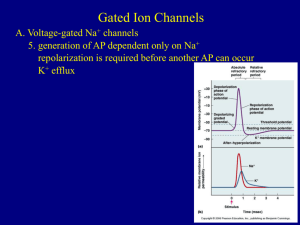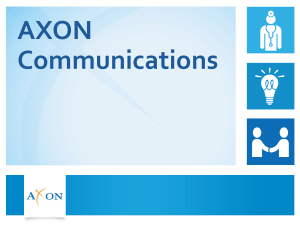Syllabus - Florida Atlantic University
advertisement
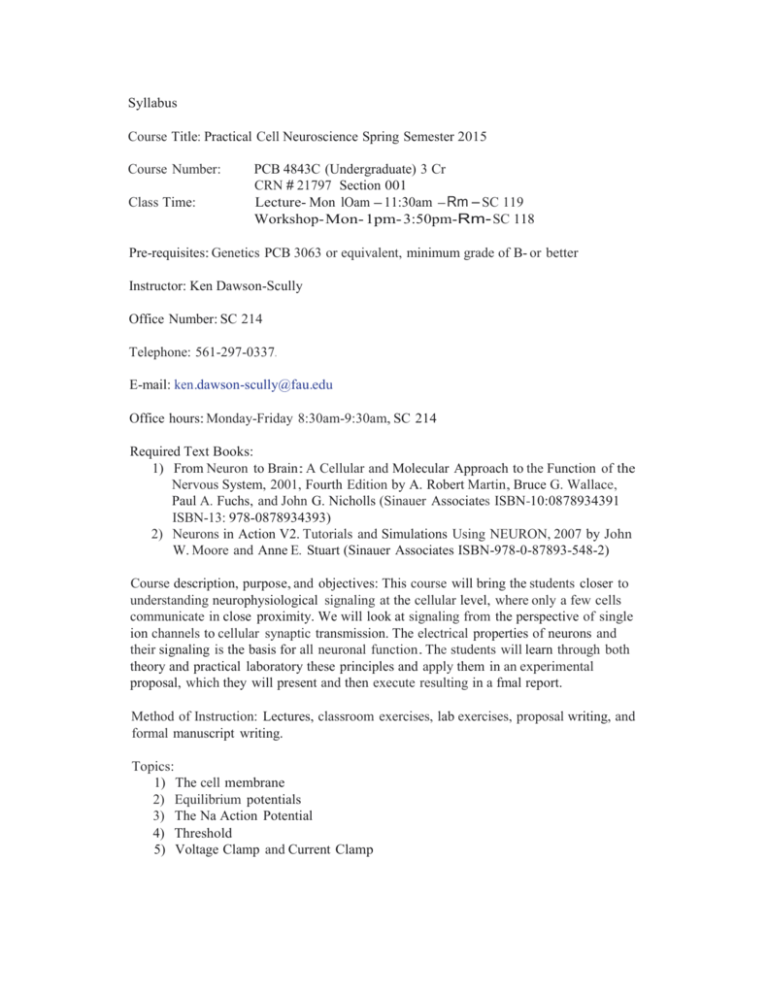
Syllabus Course Title: Practical Cell Neuroscience Spring Semester 2015 Course Number: Class Time: PCB 4843C (Undergraduate) 3 Cr CRN # 21797 Section 001 Lecture- Mon lOam - 11:30am -Rm - SC 119 Workshop- Mon- 1pm- 3:50pm-Rm- SC 118 Pre-requisites: Genetics PCB 3063 or equivalent, minimum grade of B- or better Instructor: Ken Dawson-Scully Office Number: SC 214 Telephone: 561-297-0337. E-mail: ken.dawson-scully@fau.edu Office hours: Monday-Friday 8:30am-9:30am, SC 214 Required Text Books: 1) From Neuron to Brain: A Cellular and Molecular Approach to the Function of the Nervous System, 2001, Fourth Edition by A. Robert Martin, Bruce G. Wallace, Paul A. Fuchs, and John G. Nicholls (Sinauer Associates ISBN-10:0878934391 ISBN-13: 978-0878934393) 2) Neurons in Action V2. Tutorials and Simulations Using NEURON, 2007 by John W. Moore and Anne E. Stuart (Sinauer Associates ISBN-978-0-87893-548-2) Course description, purpose, and objectives: This course will bring the students closer to understanding neurophysiological signaling at the cellular level, where only a few cells communicate in close proximity. We will look at signaling from the perspective of single ion channels to cellular synaptic transmission. The electrical properties of neurons and their signaling is the basis for all neuronal function. The students will learn through both theory and practical laboratory these principles and apply them in an experimental proposal, which they will present and then execute resulting in a fmal report. Method of Instruction: Lectures, classroom exercises, lab exercises, proposal writing, and formal manuscript writing. Topics: 1) The cell membrane 2) Equilibrium potentials 3) The Na Action Potential 4) Threshold 5) Voltage Clamp and Current Clamp 6) Ion Channels 7) The Ca Action Potential 8) The Neuromuscular Junction 9) Postsynaptic Inhibition 10) Interaction of Synaptic Potentials 11) Myelination 12) Axon Diameter 13) Temperature and Cell Signaling Practical Cell Neuroscience Lab Syllabus Spring 2015 WKS TOPICS AND ASSIGNED READINGS 1. Jan 51h, 2015 NO CLASS 2. Jan 12th, 2015 A#1: Introduction/Membrane/Equilibrium Jan 19th, 2015 Dr. Martin Luther King, Jr. Holiday- NO CLASS 4. Jan 26th, 2015 A#2: The Na AP!Threshold/Ca Sensitivity ofNa Channel 5. Feb 2nd, 2015 A#3: Non-Uniform DensityNoltage Clamping/Chattering Channels 6. Feb 91h, 2015 A#4: TheCa AP/The NMJ/Postsynaptic Inhibition 7. Feb 16th, 2015 A#5: Interactions of Synaptic Potentials/Passive Axon/Axon Diameter 8. Feb 23rd, 2015 A#6: Unmyelinated Axon/Myelinated Axon/Partial Demyelination Mar 2°d, 2015 SPRING BREAK- NO CLASS 9. Mar 9th, 2015 A#7: Impulse Initiation/Synaptic Integration/Impulse Invasion 10. Mar 16th, 2015 PRESENTATATIONS & WORK ON PROJECT 11. Mar 23r< ,2015 PRESENTATATIONS & WORK ON PROJECT 12. Mar 30th. 2015 WORK ON PROJECT - data graphs 13. Apr 6th, 2015 WORK ON PROJECT -data graphs 14. Apr 13th, 2015 WORK ON PROJECT-data graphs DUE 15. Apr 201h' 2015 PROJECT DUE by 4pm (BOTH:hand in & email confirmation) 16. Apr 27th, 2015 FINAL EXAM at lOam in SC119 Assessment Procedures, Grading Criteria, Class Policies: 10% Quizzes (Quiz every class to show you read the lab before hand) 10% Participation 20% Assignment Sheets (These will be done during lab) 20% Proposal ofFormal Lab Report (a one page report and presentation on your proposed experiment for your Formal Lab Report) 20% Formal Lab Report 20% Exam (Comprehensive Exam) A AB+ B B- 94-100% 90-94% 86-90% 82-86% 78-82% C+ c CD+ D DF 74-78% 70-74% 66-70% 62-66% 58-62% 54-58% <54% It is the responsibility of the student to withdraw from this class, should that status be desired - the instructor cannot withdraw students from the course. The instructor will not give the grade of "I" in lieu of a grade of "D" or "F". The grade of "I" will be considered only in exceptional cases (such as serious illness) for students who are presently performing at a "C" or higher level in the course. Attendance. Students are expected to attend all scheduled classes. If you miss a class you are responsible for ALL the material covered during that class, including lecture material and rules and regulations about the course (such as penalties for late assignments, etc.). Students will not be penalized for absences due to participation in University-approved activities, including athletic or scholastics teams, musical and theatrical performances, and debate activities. These students will be allowed to make up missed work without any reduction in the student's final course grade. Reasonable accommodation will also be made for students participating in a religious observance Homework assignments and papers. The papers and homework are due on the dates assigned. These will be accepted up to 1 week late, but they will be penalized. None will be accepted over 1 week late. Final Exam. The fmal exam will be a comprehensive exam on all material covered in this course. Accommodations for students with disabilities. In compliance with the Americans with Disabilities Act (ADA), students who require special accommodations due to a disability to properly execute coursework must register with the Office for Students with Disabilities (OSD) located in Boca Raton- SU 133 (561-297-3880), in Davie- MOD I (954-236-1222), in Jupiter- SR 117 (561-799-8585), or at the Treasure Coast- CO 128 (772-873-3305), and follow all OSD procedures. Honor Code. Students at Florida Atlantic University are expected to maintain the highest ethical standards. Academic dishonesty, including cheating and plagiarism, is considered a serious breach of these ethical standards, because it interferes with the University mission to provide a high quality education in which no student enjoys an unfair advantage over any other. Academic dishonesty is also destructive of the University community, which is grounded in a system of mutual trust and places high value on personal integrity and individual responsibility. Harsh penalties are associated with academic dishonesty. For more information, see http://www.fau.edu/regulations/chapter4/4.001_Code_of_Academic_Integrity.pdf

